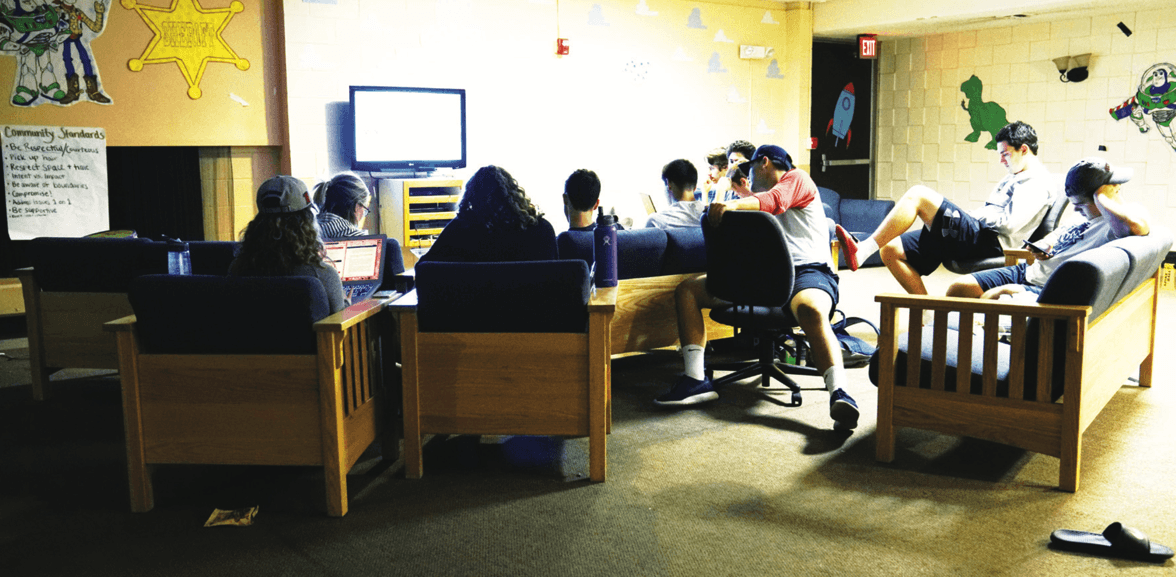Campus Safety implemented a tighter residence hall patrol strategy Nov. 4 in response to a spike in thefts on campus beginning late October. In October, 13 thefts or burglaries were reported to Campus Safety, one of which was the theft of a motor vehicle. Most of the incidents have been what Campus Safety Chief Victor Clay called “laziness thefts,” in which the victims propped open doors to their rooms or residence halls or failed to lock their cars, allowing for crimes of opportunity.
Four vehicles parked in the Newcomb parking lots were burglarized over the course of 24 hours Nov. 2.
Campus Safety obtained surveillance video footage of the culprit stealing from two of the vehicles. According to Clay, the culprit made rounds through campus banging on doors and did not cause appreciable damage to the cars. The culprit stole money out of ashtrays and glove boxes, totaling only about $20 from all four cars. The stolen items range from emergency change to sunglasses.
Clay found the suspect Nov. 3 at an AM/PM convenience store on York Blvd and confirmed he was the sole perpetrator of the car burglaries, but unrelated to the residence hall thefts.
“He’s a local kid, he’s homeless and he’s just panhandling,” Clay said.
Clay gave the perpetrator $20 and a list of resources to which he could go for support, and offered that he come to the Campus Safety office if ever in need of help in the future — on the condition that the perpetrator quit stealing from Occidental.
“I didn’t want to report him to LAPD because what happens is, he’s a juvenile, he’s under 18, and it would take a cop out of the field for like 12 hours trying to process him,” Clay said. “He won’t go to jail. Nothing will happen to him for stealing $20, except it will put a record on him and he’ll never be able to escape that.”
Clay made the decision to offer support to rather than punish the culprit based on the restorative strategies he has understood to be most effective in his nearly 30 years of experience in law enforcement. At the same time, Campus Safety does inform every victim of a crime that they have the option of reporting any crime to the Los Angeles Police Department (LAPD) if they so choose.
“If a crime victim wanted the subject arrested or detained (in the case of a juvenile), I would gladly give LAPD all information and assist them in every way,” Clay said via email.
As a tactic to discourage future thefts, Clay is working on building a face-to-face relationship with the culprit — Campus Safety will check in with him whenever they encounter him within their patrol zone — in order help him understand that stealing from Occidental’s property is a violation of trust. Campus Safety plans to keep a close eye on the culprit, since to survive in times of desperation, homeless youth have potential to relapse into criminal activity, Clay said. Campus Safety is also attempting to contact the culprit’s father, who allegedly lives in the area.
To hold the perpetrator to his word, as well as offer some closure for victims, Clay requested an apology from the culprit. Clay recorded a video of the apology, in which the perpetrator says, “I’m sorry for breaking into your cars and I won’t do it again … I will not come on campus again.” Clay showed the video to the victims.
Clay received pushback about not prosecuting the thief from some parents of the student victims.
“They want to know why he wasn’t prosecuted,” Clay said. “It’s kind of hard to tell someone who is the victim of a crime that it’s not going to solve the problem.”
If the perpetrator had been sent to jail, his release would have only required a parent to sign him out before he would be back on the street again, Clay said.
Campus Safety has yet to find any leads on the burglaries in residence halls.
Campus Safety sent an email Oct. 30 notifying the Occidental community that an unknown suspect had stolen a MacBook Pro that was left unattended for a short period of time in a residence hall common room. As of Nov. 7, that was one of eight incidents wherein a Mac was stolen on campus. Campus Safety is currently working with LAPD to identify the suspect(s).
Campus Safety conducts internal investigations of crimes on campus and reports to LAPD thefts of high value or serialized items, such as electronics that could end up on the open market and therefore potentially be recovered in another investigation. LAPD and Campus Safety work collaboratively since Occidental falls within LAPD’s jurisdiction.
According to Clay, a count of eight laptop thefts plus additional electronics thefts is significant given the size of the campus and is unprecedented in recent Occidental history.
Around 3 a.m. Oct. 30, Javion Tinsley (first year) left his $200 speakers in the Pauley computer lab. When he returned around 2 p.m. the next day, his speakers and his friend’s laptop were gone. The next day, another Pauley resident had his wallet stolen from inside his room, Tinsley said.
Tinsley did not file a report with Campus Safety because he was convinced there was no hope of recovering his and his friend’s belongings, given that last year his neighbor Luis Torres (sophomore) filed a report of a laptop stolen from his room with Campus Safety in vain. According to Tinsley, Pauley residents felt safe leaving their doors open and their belongings in common rooms prior to the string of burglaries. Now, Tinsley has stopped following the open door policy and never leaves his belongings unattended.
Around 2 a.m. Oct. 25, Myka Yamasaki (sophomore) was another victim of burglary when she and her two roommates briefly left their room in Haines to print their homework assignments. Since the Haines computer room is only about a 15-second descent down a staircase from their room, Yamasaki said that they left the door slightly cracked as per usual — but this time they all felt an unusual apprehension. On their way to the computer room they passed by someone they had never seen before headed toward their room.
“It might not even be that person,” Yamasaki said. “But just seeing someone we haven’t seen before, [my roommate said], ‘Wouldn’t that be so funny if they went into our room?’”
Yamasaki and her roommates laughed it off and printed their work.
“When we came back to our room I started freaking out,” Yamasaki said.
Their door was wide open and Yamasaki’s laptop and purse were missing. She called Campus Safety, who promptly arrived to file a report.
“I was surprised to hear that I wasn’t the first one this week,” Yamasaki said. “I wished I’d heard from them earlier via campus email or something that this was happening and I probably would have closed my door.”
Yamasaki valued the open door policy of many first-year halls and thinks all residence halls should be places that students feel safe to leave their doors open.
“The open door policy was something that people take advantage of,” Yamasaki said. “If your door was open then people would come into your room to hang out with you and introduce themselves. In that way, it can foster community.”
Now, Yamasaki does not leave her door open, even when she is in the room.
“It makes me nervous that this person was very brave,” Yamasaki said. “Our door was not completely open, so they were taking a gamble opening our door and going in. How do you know we weren’t about to come back in five seconds and catch you?”
Yamasaki acknowledged that student complacency about security measures, especially leaving propped room and exterior doors unattended, could have allowed the theft. According to Yamasaki, students frequently prop open or tape the locks of exterior doors in Haines that are not accessible with key cards but are conveniently located.
“You could be a stranger entirely to Oxy and come into Haines because there are so many unlocked doors,” Yamasaki said.
She thinks increased Campus Safety patrol of those doors might be helpful, but not the solution. Yamasaki noticed the lack of security cameras outside residence halls and suggests them as a way to provide concrete evidence that LAPD could use in crime investigations.
“I feel like people don’t even think it’s worth it to take their thefts to LAPD because we have no information on the suspect and a lot of people don’t know the serial numbers on their laptops,” Yamasaki said.
Clay has been pushing for surveillance cameras on the exteriors of residence halls since he began working at Occidental in 2014 but has yet to see his budget request for cameras approved by the Finance Office, Facilities Management and Information Technology, who work with Campus Safety in assessing campus security and implementing safety measures. Approval of this request will take time, Clay said.
In the absence of cameras, Campus Safety’s response to the spike in thefts on campus was to initiate Residence Hall Patrols, which ramped up their existing patrol strategy.
Campus Safety normally uses the “shark method” in which the patrollers never stop moving — a tactic borrowed from sharks who must swim constantly in order to survive. Typically, Campus Safety constantly moves while patrolling the perimeter of the college and leaving the interior open, namely, stationing fewer officers in busy campus areas in order to give Occidental community members their space. The rise in high-value, concealable thefts prompted Clay to ramp up the patrol effort and station more officers on campus rather than farther out in their patrol zone: the area between York Blvd, Eagle Rock Blvd, Yosemite Dr. and Ave 51/Townsend Ave.
Campus Safety officers take advantage of their ability to develop facial recognition of Occidental’s small community to identify unfamiliar faces on campus. According to Clay, these faces are normally Eagle Rock community members passing through or using public spaces such as the fountain, but sometimes strangers draw suspicion by lingering in remote areas of campus intended primarily for students, such as the Stearns parking lot.
As part of their stricter patrol strategy, Campus Safety officers tightened the proximity of their rounds to focus on the exterior of buildings, looking for propped doors and malfunctioning door locks. They briefly check in common rooms to observe the overall status of common areas but will not patrol through hallways or bathrooms.
“Campus Safety will not invade the privacy of the residence areas or adjacent hallways, unless called to respond or in case of emergency,” Clay said via email. “Campus Safety respects the privacy of the Oxy community and only hopes to reduce/eliminate future occurrences of theft, and to increase the level of safety in and around residence halls.”
Campus Safety’s main goal, according to Clay, is to be more visible to both students and potential criminals. In response to concerns Clay received from Occidental community members, he stresses that officers will never stop and search students.
Clay plans to continue the Residence Hall Patrols throughout the end of the semester, and emphasized that anyone can call Campus Safety for clarification on how officers conduct patrols.
Two years ago, Residential Education and Housing Services (REHS) expanded key card access to allow students entry into all residence halls. They revoked this policy Nov. 3 in response to the recent thefts; now, students can only enter their own residence halls.
Campus safety is currently mapping and analyzing the crime reports to find patterns in the residence hall thefts, but has yet to find any leads.
Speaking from theft cases he watched unravel during his years in law enforcement, Clay said there is hope that victims get back their stolen items — or at least parts of them, maybe years down the line. Clay referenced a sting operation in which LAPD recovered stolen bikes from a chop shop around Eagle Rock this summer. All of the recovered bikes were tracked back to distant cities such as Santa Monica, but none from Occidental despite last year’s rise in bike theft on campus. Clay advised students to be vigilant and proactive about their security, especially at this time of the year. Annually, thefts spike during student move-in and move-out and during final exams, which corresponds to the more widespread trend of increased crime during holidays, Clay said.
According to Clay, the library is a hot spot for thefts around finals season because it is open to the public and students frequently leave their possessions unattended. Clay suspects, given the latest trend in campus crime, that there will be some thefts in the library this finals season. Campus Safety currently conducts foot patrols in the library about four times a day and is encouraging library staff and students to report unusual activity.
“We need some help, we need some more eyeballs out there,” Clay said.
Clay advises students, faculty and staff to call Campus Safety in the event of any suspicious activity on campus at (323) 259-2599.
Have a tip? Email us at weekly@oxy.edu or tweet us @OxyWeekly.
![]()



































